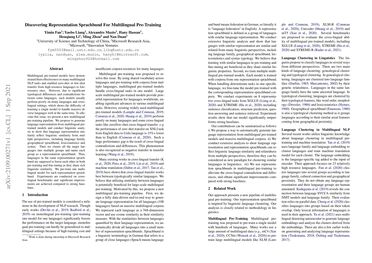Discovering Representation Sprachbund For Multilingual Pre-Training
Multilingual pre-trained models have demonstrated their effectiveness in many multilingual NLP tasks and enabled zero-shot or few-shot transfer from high-resource languages to low resource ones. However, due to significant typological differences and contradictions between some languages, such models usually perform poorly on many languages and cross-lingual settings, which shows the difficulty of learning a single model to handle massive diverse languages well at the same time. To alleviate this issue, we present a new multilingual pre-training pipeline. We propose to generate language representation from multilingual pre-trained models and conduct linguistic analysis to show that language representation similarity reflect linguistic similarity from multiple perspectives, including language family, geographical sprachbund, lexicostatistics and syntax. Then we cluster all the target languages into multiple groups and name each group as a representation sprachbund. Thus, languages in the same representation sprachbund are supposed to boost each other in both pre-training and fine-tuning as they share rich linguistic similarity. We pre-train one multilingual model for each representation sprachbund. Experiments are conducted on cross-lingual benchmarks and significant improvements are achieved compared to strong baselines.
PDF Abstract Findings (EMNLP) 2021 PDF Findings (EMNLP) 2021 Abstract

 XQuAD
XQuAD
 PAWS-X
PAWS-X
 TyDiQA
TyDiQA
 MLQA
MLQA